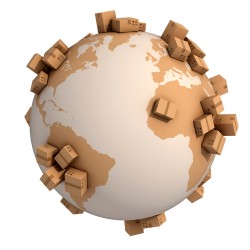We use cookies to make your experience better. To comply with the new e-Privacy directive, we need to ask for your consent to set the cookies. Learn more.
What is International Logistics?
If you’re involved with warehousing in any capacity, you’ve likely heard the term “international logistics.” It’s a fairly large and complex concept — in short, it encompasses the entire process of controlling the movement of goods as they travel from one country to another.
International logistics includes a close consideration of every factor involved in the flow of products, people, and paperwork, starting from the acquisition of raw materials and ending with the product’s purchase. In a traditional framework, the flow of goods is as follows: raw materials are harvested, components are produced from the raw materials, the final product is produced, goods travel to wholesalers, wholesalers distribute the goods to retailers, and customers purchase and use the goods. Along the way, the business will need to take every possible step to control costs and maintain an efficient supply chain.

The Goal of International Logistics
Given the large scope of this process, minor inefficiencies can become glaring issues, which is why careful planning is an essential element of an international strategy. If your business intends to manufacture goods in one country and market them in another, your ability to manage international logistics will play an important role in your success.
While businesses use hundreds of different international logistics strategies, the goals of these strategies are identical: to limit costs while maintaining good customer service and product quality. The second half of that sentence is important — logistics doesn’t mean sacrificing your brand. Think of it as streamlining the paperwork, improving your workflow, cutting material costs, and perhaps most importantly, monitoring everything to spot inefficiencies before they become major issues.
International Logistics and the Material Handling Industry
Few components of international logistics are as important as material handling and warehousing. In order to sell products outside of their physical country of origin, you need to be able to make reliable, timely, and cost-effective shipments.
Lift truck fleet tracking becomes an especially important component of supply chain management. When a forklift fleet is properly monitored, essential maintenance tasks remain on track across multiple facilities. Managers can maintain an adequate number of spare parts to keep warehouses and storage facilities fully operational, and inefficiencies can be easily located.
Businesses that operate internationally often have large, powerful forklift fleets, so they need to find appropriate battery handling solutions to keep their lift truck fleets on the floor. Proper battery room outfitting with operator aboard battery extractors and other equipment can keep an international operation safe, efficient, and productive.
Finding Additional Resources for International Logistics
There are a number of helpful resources for businesses considering international logistics. The International Chamber of Commerce (ICC) introduces itself as "a representative body that speaks with authority on behalf of enterprises from all sectors in every part of the world." The ICC offers training in international business practices. They also run the International Court of Arbitration, which resolves conflicts between enterprises across national boundaries. The ICC publishes International Commercial Terms (Incoterms) that provide international standards for trade between nations. The latest version of the Incoterms is available for a fee on their website.
For companies in the United States, the U.S. Department of Commerce offers Export Assistance Centers in most major cities. Find your local office at the Department of Commerce site. The U.S. government also runs a very helpful website on exporting at export.gov. U.S. Customs and Border Protection provides a wealth of information on importing and exporting on their site as well.
References:
Behar, Alberto, Philip Manners, and Benjamin D. Nelson. "Exports And International Logistics." Oxford Bulletin Of Economics & Statistics 75.6 (2013): 855-886. Business Source Premier. Web. 8 July 2015.
"International Logistics." Export.gov. United States Department of Commerce, n.d. Web. 08 July 2015.
“Introduction to ICC - English.” International Chamber of Commerce. International Chamber of Congress, n.d. PDF. 8 July 2015.
Wood, Donald, Anthony Barone, Paul Murphy, and Daniel Wardlow. "International Logistics." Springer Science & Business Media, 1995. 1-6. Google Books. Web. 8 July 2015.
